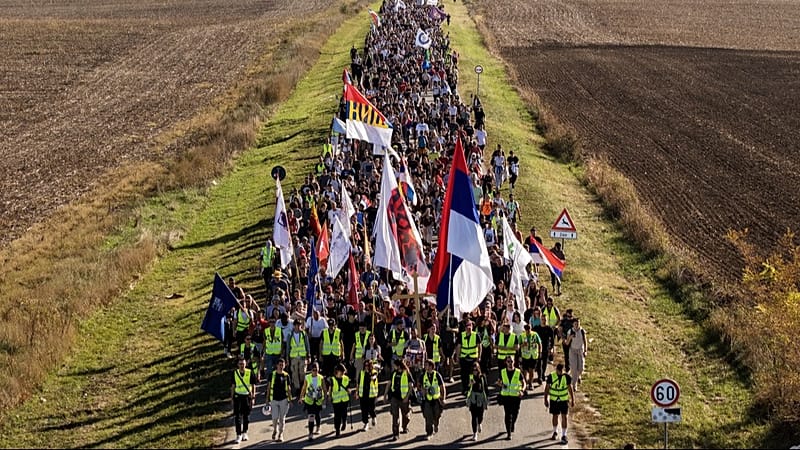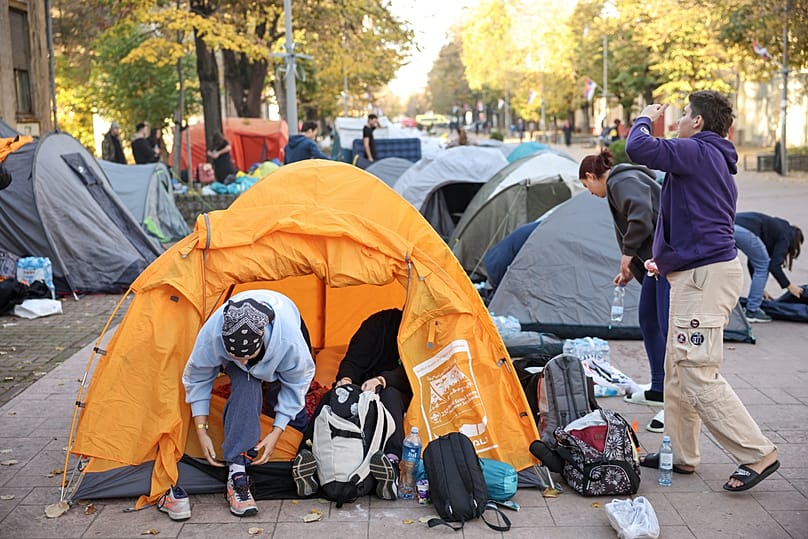Major demonstrations planned to mark one year since tragic awning collapse at Novi Sad train station

Tens of thousands of students and opponents of incumbent Serbian President Aleksandar Vučić are converging in the northern city of Novi Sad to stage a commemorative rally to mark one year since a concrete awning collapsed at a train station in the city, killing 16 people.
Ahead of the commemorative rally, momentum has been building in favour of opposition demands for major changes in the Balkan country, after nearly a year of student-led anti-government protests that have seriously shaken Vučić and his firm grip on power.
As thousands of protesters arrive in Novi Sad from all over the country, Vučić has threatened mass arrests if the mourners “resorted to violence,” defiantly adding that his supporters are planning “a much bigger” rally in the city later in November.
He has also tried to downplay the expected size and importance of the commemorative opposition rally. When asked by a TV reporter to comment on the commemoration on Saturday, Vučić said: “What is happening in Novi Sad? Is some soccer match being played?”
He also noted that “many will be disappointed due to excessive expectations from the rally," adding that “there will be no change of government.”
Most of the student led-protests have so far been peaceful, with sporadic incidents caused by Vučić supporters.
However, tensions are boiling after a year of protests and emotions are high. Riot police have cracked down hard against the protesters. Hundreds of Vučić's opponents have been arrested for taking part in the previous anti-government rallies, including at least two huge demonstrations in the capital, Belgrade.
People are expected to gather in several separate rallies throughout Novi Sad, a tactic believed to be designed to make it more difficult for police to intervene and arrest participants than if one single rally was held at a central location.
The catalyst for monthslong protests was the deadly collapse of a railway station awning on 1 November last year, which resulted in 16 fatalities.
This incident has been widely attributed to governmental negligence, endemic corruption and shady deals made with Chinese construction firms, which were involved in renovation works carried out at the railway station.
They started as sporadic demonstrations seeking solely accountability for the tragedy in Novi Sad.
They however rapidly evolved into a nationwide movement addressing broader issues, which also included demands such as snap elections and major democratic reforms following the violent crackdowns, garnering widespread support across the country.
Vučić at first tried to ease the pressure by sacrificing Prime Minister Miloš Vučević, who resigned in January along with the rest of the government. While a few officials were charged over the disaster in Novi Sad, so far no one has been tried, convicted or sentenced.
Vučić has since described the protests as a ploy organised by the West to oust him from power, instead turning to Russia’s President Vladimir Putin as well as China for support, as crackdowns on liberal rights groups at home persisted.
Thousands of people were expected to take the train from Belgrade to Novi Sad to join the rally.
On Friday however, the state railway company announced that all trains between the two cities were terminated indefinitely, due to an apparent bomb threat. The company has previously deployed similar tactics ahead of other mass protests in recent months.
The gathering on Saturday is still expected to draw large numbers nonetheless, and could easily turn into one of the biggest rallies ever in the troubled Balkan nation, which has a long history of anti-government demonstrations.
Today




